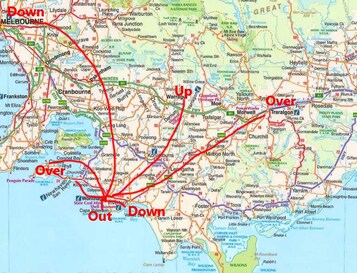 How Wonthaggi people get around
How Wonthaggi people get around A QUESTION from my former high school woodwork teacher Bill Robertson caught me off guard, and his smile and the twinkle in his eyes suggested a 'gotcha' moment. The question was this: how do you tell someone is a Wonthaggi local? I had always considered Bill to be a prominent local identity and knew that he was not born here so I was able to eliminate notions of birth in the local hospital or multiple generations buried in our cemetery.
My answer wasn't what Bill had in mind but I was somewhere in the right paddock. It had to do with a pattern of speech that 'locals' employ in relation to how they move about to places outside our town. Although I also use this mode of speaking, again, I wasn't conscious of it till Bill pointed it out. He named a series of towns in the district and region and asked me to express how I would tell someone I was going there or had been there. As I gave my answers, Bill nodded with approval and his smile broadened.
What he had been getting at was that there are basically five ways of getting to places outside Wonthaggi: up, down, out, over and around to. We go 'up to' anywhere north of the Princes Highway or Melbourne; up to Bendigo, Mildura, Walhalla, NSW, etc. This is not exclusively a Wonthaggi trait. If one is holding a map vertically, then it's a logical approach to take. But many newcomers to the town are surprised to learn that we go down to Melbourne. More locally, we go 'up' to Blackwood Forest, Glen Alvie, Krowera, and Mirboo North.
We go 'out' to West Creek, Lance Creek, Archies Creek, Ryanston, South Dudley, Hicksborough, Cape Paterson, Harmers Haven, Cutlers Beach, Baxters Beach and Williamsons Beach, Kongwak, Dalyston and Kilcunda- unless you're one of the post-war Italian immigrants who go 'down' to Kilcunda. From there, on the Bass Highway it's all 'down' to Anderson, Bass, Corinella, Grantville Lang Lang, and all the way to Melbourne as previously mentioned. Down is also how we get to Inverloch (unless you go via Cape Paterson in which case you go around to), Tarwin Lower, Fish Creek, Walkerville, Sandy Point and Wilsons Promontory.
‘Over to’ is how we arrive at San Remo, Phillip Island, Churchill Island, Loch, Korumburra, Leongatha and all the towns on the Princes Highway between Drouin and Traralgon, along with Thorpedale, and Foster, though some go down to Foster. Giving someone directions to Sale from Wonthaggi will involve most of the above manoeuvring. You go out on the Inverloch road down to Inverloch, over to Leongatha, up through Mirboo North and over to Morwell and then up the Princes Highway to Sale. An alternative route is down to Inverloch, over to Koonwarra, down to Foster, Toora, Welshpool and Yarram, and up to Sale.
There are other nuances which take the form of abbreviations that are common to all towns and communities. Wonthaggi people don't go to Cape Paterson, San Remo, Phillip Island, Harmers Haven, Wilsons Promontory, the Kilcunda pub or Caledonian hotel. They go out to Cape, over to Sanny, over to the island, out to Harmers, down to the prom, out to the Killy pub and down to the Cally. When going to the shops, they go down the street. If you live on the south side of town, you go over (the railway tracks?) to North Wonthaggi.
At their most extreme, notions of who is a local and who is not can be a form of snobbery or even a class system that works outside the traditional socio-economic definition of the term. Bill Robertson had no such intention or motive when he posed his question to me. That's not who he was. He was merely sharing an anthropological observation. I must admit that I have two categories of locals. There are those who have been around for as long as I can remember, those people who remember the town as it was in my earliest memories and remember events and characters from those days. Then there are those who have arrived since then and have embraced the spirit of the place and have blended in as though they had always been here, contributing in various ways that enrich our community and help make it stronger.
One character in the Bass Coast Shire with a healthy sense of humour whom I only met this morning, and with whom I raised the subject of this article, had this to say of the kind of closed shop communities that would never accept him as a local regardless of how long he lived in the place where he resides or the social contribution he makes there. His answer to people with such an attitude is "I don't want to be a local. I don't want to marry my cousin. As much as I like her, I'm not attracted to her". He had made the astute observation that such communities exist with an identity in a state of stagnation based on the past that doesn't allow for healthy forms of progress, renewal and evolution.